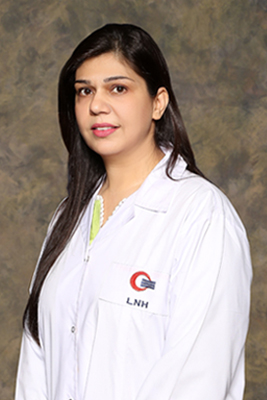Paediatric nephrology is a well-defined & much needed specialty in Paediatrics. Nephrotic and nephritis syndromes are most common presentations in Pakistan.
Paediatric nephrology in Liaquat National hospital has expertise in the management of children and infants with:
- Congenital anomalies of the renal tract
- Nephrotic syndrome
- Glomerulonephritis
- Vasculitis
- Inherited and acquired forms of tubulopathies
- Urinary tract infection (UTI)
- Vesico-ureteric reflux (VUR)
- Renal stone disease
- Hypertension
- Inherited nephropathies
- Renal stones
- Chronic kidney disease
- Acute Kidney injury
What is Nephrotic syndrome?
Nephrotic syndrome is a group of symptoms that occur when your kidneys are unable to filter blood or remove waste and excess fluids through urination. The condition is caused by damage to the glomeruli, the tiny blood vessels that filter blood in your kidneys.
When the glomeruli are damaged, protein from the blood seeps into urine. This causes a buildup of waste and water in body, which can lead to chronic kidney failure. Therefore, need to be treated on urgent basis.
Signs & Symptoms:
Nephrotic syndrome symptoms can be severe, including:
- Fatigue
- Foamy or bubbly urine, caused by proteinuria
- Hematuria (blood in urine/red or pink colour urine)
- High cholesterol or triglyceride levels in the blood
- Hypertension (high blood pressure)
- Proteinuria (too much protein in the urine)
- Weight gain, due to fluid buildup
Chronic Kidney Disease (CKD)
Chronic kidney failure is the last stage of chronic (slowly worsening) kidney disease. Also called as end-stage renal disease. It occurs when your kidneys can no longer filter blood or remove waste and excess fluids from your body during urination. As toxins and fluids build up in your body, it causes severe, life-threatening damage that can harm your kidneys, heart, brain, lungs, and bones.
Chronic kidney failure is the last stage of chronic (slowly worsening) kidney disease. Also called as end-stage renal disease. It occurs when your kidneys can no longer filter blood or remove waste and excess fluids from your body during urination. As toxins and fluids build up in your body, it causes severe, life-threatening damage that can harm your kidneys, heart, brain, lungs, and bones.
Signs & Symptoms:
The most common sign of chronic kidney failure is uremia, a collection of symptoms that includes:
- Nausea and vomiting
- Fluid buildup around the heart
- Nerve problems
- Shortness of breath
- Confusion
- Seizures
- Coma
Frequently Asked Questions
Blood in urine, called hematuria, isn’t uncommon in children. If your child has blood in their urine, it can look pink, red, or brown. Sometimes the amount of blood in the urine is so small that it can only be detected with a urine test (urinalysis).
Children can have blood in their urine for many reasons, including:
- Bladder, kidney, or urinary tract infections (UTIs)
- Food dyes or certain foods
- Inherited disorders, such as sickle cell anemia or Alport syndrome
- Kidney or bladder cancer (rare)
- Kidney disease or injury
- Kidney stones
- Medicines, such as penicillin or over-the-counter pain medicines
- Strenuous exercise
Protein in urine, called proteinuria, is usually no cause for concern. It’s not uncommon for children to have a temporary rise in protein levels in the urine, which could be caused by:
- Dehydration
- Emotional stress
- Exposure to extremely cold temperatures
- Fever
- Strenuous exercise
When protein levels are consistently high, it can be a sign of an underlying disease, such as kidney disease. Symptoms of proteinuria can include:
- Decreased appetite
- Foamy urine
- High blood pressure (hypertension)
- Swelling of the face, abdomen, arms, hands, legs, or feet
- Weight gain, caused by fluid retention
If your child has swelling on the body and initially it was only around the eyes, and now it is increasing with time, you need to consult the Paediatric Nephrologist, as it can be because of different renal illnesses.
Urinary tract infections (UTIs) are common conditions that affect your bladder or urethra (the tube that carries urine from the bladder and out of your body). Urinary tract infections can cause pelvic pain, pain when urinating, or blood in the urine. It is more common in girls but boys can also be affected.
Common symptoms of UTI are:
- Fever with chills
- Urinary urgency / increased frequency of urine
- Pain in lower abdomen while passing urine
- Hazy urine
Vesico-ureteral reflux is the irregular flow of urine from the bladder returns back to the ureters (tubes that run between the kidneys and the bladder). Normally, urine flows one way, from the kidneys to the bladder. Vesico-ureteral reflux increases a child’s risk of urinary tract infections (UTIs), which can lead to kidney damage.
Symptoms of vesico-ureteral reflux may include:
- Bedwetting
- Burning feeling when urinating
- Cloudy, strong-smelling urine
- Constipation or inability to control bowel movements
- Fever
- Hematuria
- Hypertension
- Kidney failure
- Pain in the side or abdomen
- Passing small amounts of urine frequently
- Proteinuria
- Strong, persistent urge to urinate
Chronic Kidney Disease, or CKD, often causes growth failure. In fact, about a third of children with CKD also experience growth failure. One aspect of normal kidney function is to help regulate the body’s ability to process growth hormone, that is, how children grow and develop. With CKD, this hormone regulation does not occur normally.
Signs and symptoms of CKD-related growth failure include:
- Acidosis (imbalance of sodium, potassium, and acid-base levels in the child’s blood)
- Anaemia
- Little interest in eating
- Malnutrition
- Urinating more than usual (polyuria)
Renal replacement therapy (RRT) is a treatment that’s used for children with kidney (renal) failure (when the kidneys stop working). This therapy uses a machine or another approach to take over the normal function of your child’s kidneys.
Signs and symptoms of CKD-related growth failure include:
- Acidosis (imbalance of sodium, potassium, and acid-base levels in the child’s blood)
- Anaemia
- Little interest in eating
- Malnutrition
- Urinating more than usual (polyuria)
If your child has kidney failure, part of their treatment will include dialysis (a process that filters your blood and removes harmful waste) while they’re waiting for a kidney transplant. If your child’s kidney failure comes on suddenly (acute renal failure), they may need continuous hemofiltration (another process that filters blood) until they’re stable enough to tolerate another, longer-term type of dialysis.
- Peritoneal dialysis: This type uses the membrane that lines the abdomen and covers abdominal organs (peritoneum) to act as the filter for your child’s blood. This type of RRT may use a machine (automated peritoneal dialysis) or can be done without using a machine (manual).
- Intermittent hemodialysis: In this type of RRT, a machine filters wastes, salts, and fluid from the blood. You will receive hemodialysis in our clinic, usually three times a week for a session of three to five hours each.
Faculty

Contact
Please call us on 021-34412474.

